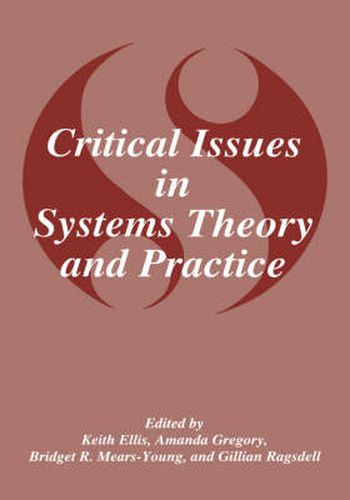Readings Newsletter
Become a Readings Member to make your shopping experience even easier.
Sign in or sign up for free!
You’re not far away from qualifying for FREE standard shipping within Australia
You’ve qualified for FREE standard shipping within Australia
The cart is loading…






This title is printed to order. This book may have been self-published. If so, we cannot guarantee the quality of the content. In the main most books will have gone through the editing process however some may not. We therefore suggest that you be aware of this before ordering this book. If in doubt check either the author or publisher’s details as we are unable to accept any returns unless they are faulty. Please contact us if you have any questions.
The systems movement, now 40 years old, is made up of many associations of systems thinkers from different disciplines all over the world. The United Kingdom Systems Society (UKSS) was formed in 1978. Today it has over 300 members and is committed to the development and promotion of systems philosophy, theory, concepts and methodolo gies for improving decision making for the benefit of organizations and wider society. The first UKSS International Conference was held at the University of Hull in July ofHuddersfield 1989. Since then we have held International Conferences at the Universities (1991) and Paisley (1993). The UKSS International Conferences are now an established biannual event and this, our fourth international conference, will be jointly hosted by the Universities of Hull and Humberside. Systems science is considered to be a trans-discipline which promotes critical and effective intervention in complex organisational and social problem situations. As such it traverses hard , through soft to critical systems thinking and methodologies. Yet, despite the currently robust state of the UKSS the systems movement cannot be described as an international movement: different subdisciplines are at different stages of development and are often engaged in pursuing their own particular interests and themes with little conversation between the subdisciplines despite their common interest in systems.
$9.00 standard shipping within Australia
FREE standard shipping within Australia for orders over $100.00
Express & International shipping calculated at checkout
This title is printed to order. This book may have been self-published. If so, we cannot guarantee the quality of the content. In the main most books will have gone through the editing process however some may not. We therefore suggest that you be aware of this before ordering this book. If in doubt check either the author or publisher’s details as we are unable to accept any returns unless they are faulty. Please contact us if you have any questions.
The systems movement, now 40 years old, is made up of many associations of systems thinkers from different disciplines all over the world. The United Kingdom Systems Society (UKSS) was formed in 1978. Today it has over 300 members and is committed to the development and promotion of systems philosophy, theory, concepts and methodolo gies for improving decision making for the benefit of organizations and wider society. The first UKSS International Conference was held at the University of Hull in July ofHuddersfield 1989. Since then we have held International Conferences at the Universities (1991) and Paisley (1993). The UKSS International Conferences are now an established biannual event and this, our fourth international conference, will be jointly hosted by the Universities of Hull and Humberside. Systems science is considered to be a trans-discipline which promotes critical and effective intervention in complex organisational and social problem situations. As such it traverses hard , through soft to critical systems thinking and methodologies. Yet, despite the currently robust state of the UKSS the systems movement cannot be described as an international movement: different subdisciplines are at different stages of development and are often engaged in pursuing their own particular interests and themes with little conversation between the subdisciplines despite their common interest in systems.